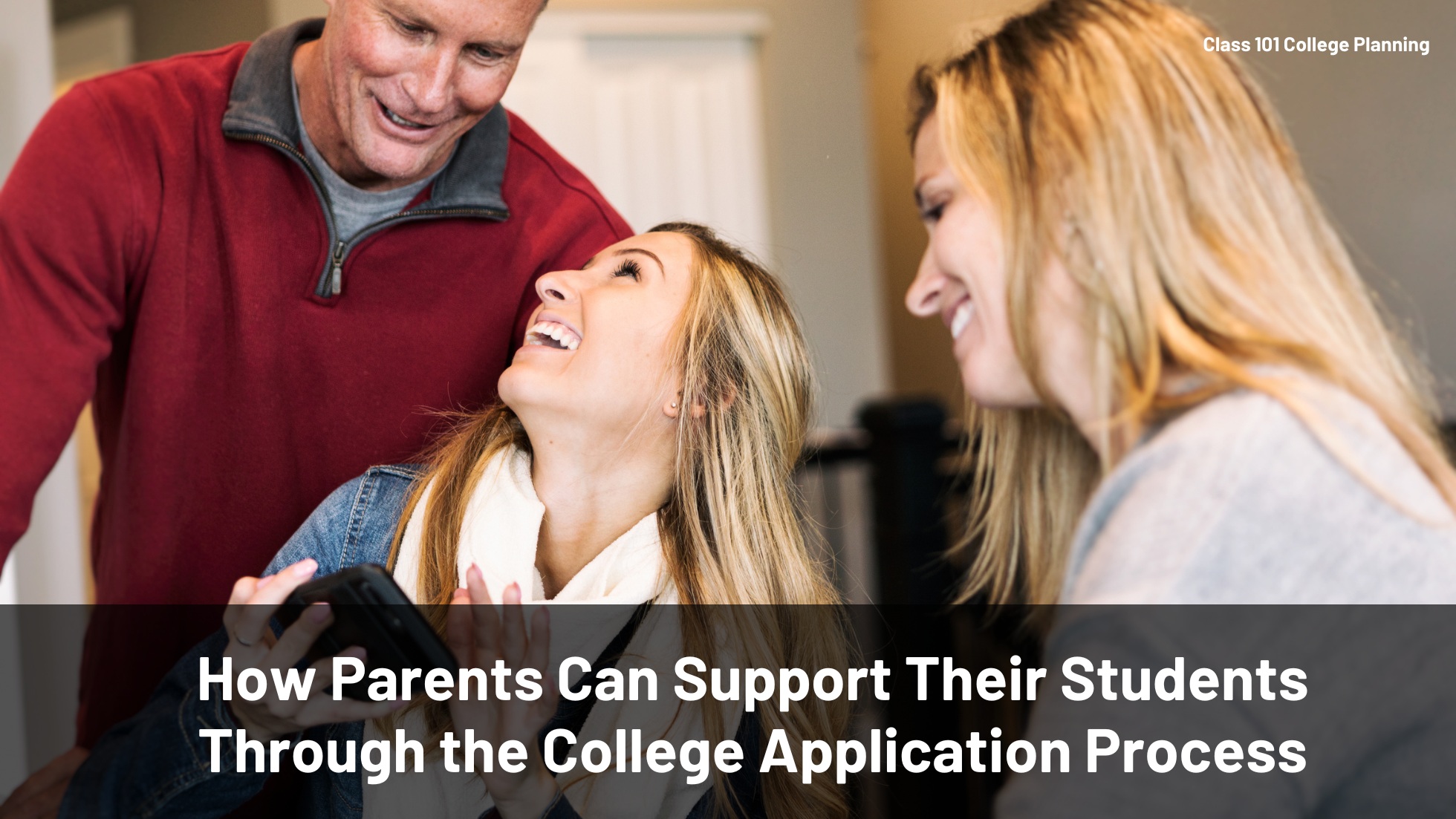September 10, 2024

Getting a good college application together requires letters of recommendations, transcripts, and a good college essay. However, one of the most valuable components is too often overlooked—parents and guardians.
Parents are critical, not just in keeping students to deadlines but also in providing support and guidance during a pivotal moment of their lives. While the obligations can at times seem overwhelming, our experience shows parents can best support their students by staying mindful of a few key points. In this blog, we’ll run through these items to ensure your student can get a head start on their college journey.
For most families, the college application season starts August 1st when the Common App opens. From there, students are faced with an array of different deadlines. Early Action and Early Decision applications, two processes where students can apply early and receive admission offers early, typically close in November. Regular Decision, that being the normal application process, typically closes in January. Each school may have their own separate application deadlines for specific types of scholarships and programs.
Aside from working with a Class 101 College Advisor to stay up to speed, the most valuable thing any parent can do at the start of the college journey is to open a calendar and plot out the dates to stay mindful of. If a student wants to apply to a set of particularly exclusive schools, it may be beneficial to go to that college’s website to see when their Early Action or Early Decision application process opens (though all schools operating on the Common App open August 1st) and what their respective deadlines are. If a student is applying to a particular program with application requirements separate from the main university, it may be useful to note down those dates as well.
As writing an essay, compiling letters of recommendation, and completing financial aid forms can take some time, we encourage families to work backwards from those deadlines to develop personal milestones to work toward. If, for example, a student is applying in January, it may be useful to have a first draft of their essay done by the start of their senior year so they can spend the following months revising it and working on any supplemental essays.
The college application process is stressful to everyone but it is most stressful for the student at the center. Many students spend these few months acutely aware of how closely they are being scrutinized. They are forced to account for every decision they’ve made in high school or earlier. At the end of the application process, they must make a big decision about their future.
While students can, at times, be their own source of stress, it’s critical for parents to be encouraging and supportive. By listening to students’ concerns, validating their opinions, and helping them to manage stress, parents can help them to develop the confidence they’ll need over the next few months, not just in completing the various application materials but also in making a decision they will be happy with.
In all this work, what is essential is open communication. Be clear about what you expect from your student and give your student the chance to tell you what they want. In this way, you can understand how best to support them and ensure they follow through on applications.
Once a parent understands what their student wants, they can help by giving them the information they need to narrow their choices. If a student has a passion for a particular subject, a parent might identify colleges and universities known for that program. They can work with students to understand the kinds of interests, preferences, and financial considerations to remain mindful of and the kinds of colleges that meet those qualifications.
Once a college or set of colleges is identified, a visit to campus can help students to make a decision. It can often be hard to know if you’ll “fit in” a given college community until you have visited yourself.
We encourage parents to be willing to go with their student on campus visits, to both provide support and reinforce their importance.
Throughout this process, it may be useful for parents to keep a checklist to ensure that they can track all the work that has happened thus far, good and bad leads, and work that remains left for the schools they want to apply to.
While there are different kinds of college application systems, the core components of a college application are the same for almost all students. They will need their transcripts, standardized test scores, a personal essay, and a resume. Financial aid forms, such as FAFSA, require basic information about a family’s financial situation that parents can compile.
Parents can provide guidance when it comes to gathering these documents. For test scores, parents can work with students through practice tests to identify areas of weakness. For personal essays and resumes, parents can act as a source of critique and give feedback on drafts as they arrive. The best essays often take multiple rounds of edits to ensure the message is clear and impactful.
However, it’s essential during this process that parents not do everything for a student. While it can be tempting to jump in, to tell a student’s story for them, doing so can undermine their independence and autonomy in ways that might make it harder for them to transition to college. It might also reduce their chances of acceptance as their own voice may become “muddled” if other people do the work for them.
Students need a guide, not someone who will do the work for them.
Finally, the most important action that a parent can take is to help their student make their own choices. The college journey is a big moment in anyone’s life. It is, as mentioned, one of the first important choices that a student will make about their future.
Parents should be ready to support if called upon but should not take the wheel from their student. They should let students follow their own passions and interests. While parents can give advice, it is important that it remains advice and that parents not take autonomy away from their student.
By letting them take the lead, parents can avoid arguments and ensure that students are happy with where they apply.
Give students the space they need to explore the world around them, to develop their interests. In doing so, parents can help their students make the transition to adulthood.
***
The college application process takes enormous hard work and dedication, not just from students but parents as well. Throughout the process, it’s important to celebrate small achievements and milestones, to acknowledge the work that has been done and the work that remains.
Although it can be stressful, we encourage parents and their students to stay positive and focused on their goals. There are many exciting opportunities that are ahead.
If these tips were useful and you want more, we encourage you to reach out to a Class 101 College Advisor near you today. Having helped countless students across the country, we have the expertise you need to make your college application process simple and stress free.

June 24, 2025
It’s around this time of year that many students and families start looking for the right college. This process tends to start with a college list, a collection of schools to apply to that match a student’s academic profile, interests, and the kind of experience they want to have. Having a well-rounded, strategic list of […]
Read More >
June 20, 2025
Every year, Class 101 awards scholarships to four high school students through the 101 Scholars program. Given to students of outstanding merit, it asks students to explain how they’ve used their skills and talents to change their community and the lessons they’ve learned from these experiences. This year, Class 101 is pleased to announce the […]
Read More >
May 22, 2025
One of the central parts of the college application process is the application essays. While grades and test scores give some hint at a student’s capabilities, the essay provides an opportunity for a student to present themselves on their terms. It can be used to show not only who they are but how they think […]
Read More >